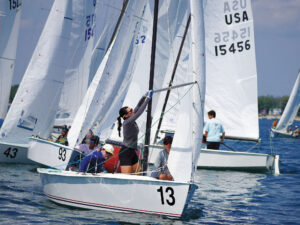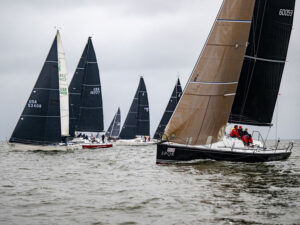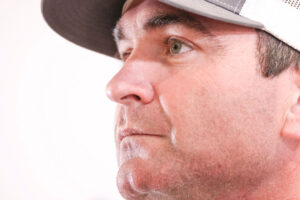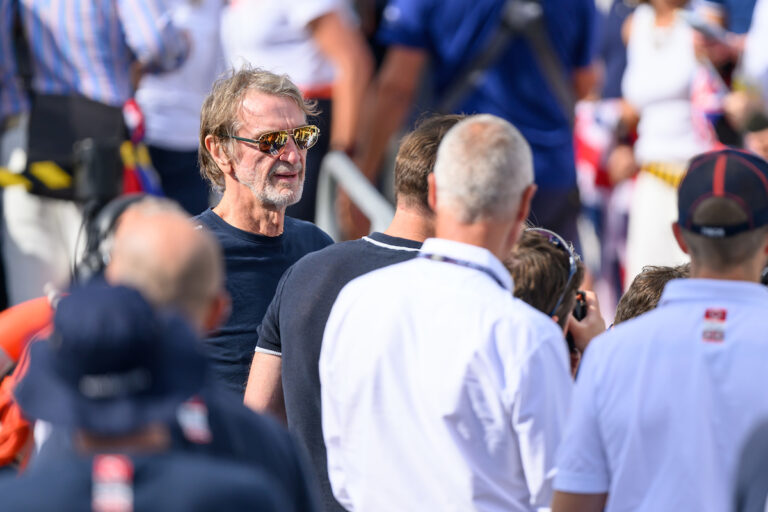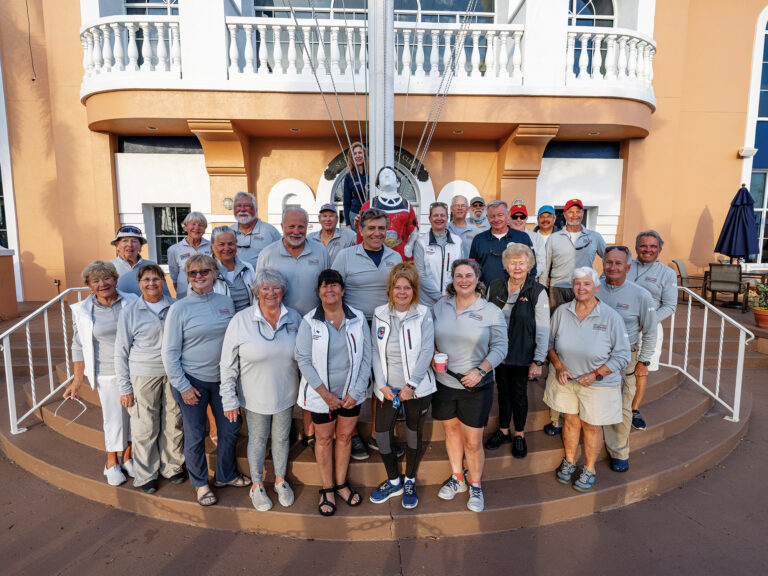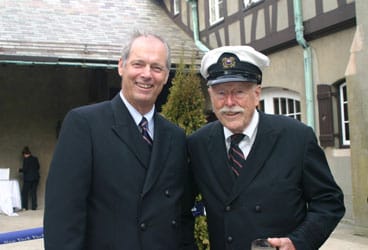
Jobson Report: Anderson
Whenever I run into Commodore Henry Hill (Harry) Anderson, Jr. around the waterfront, he delves into a story he believes will be helpful to me. This routine between us has been going on for nearly 40 years. And, often, without solicitation, I will receive from him a detailed letter and accompanying materials about some historical fact or point of view. Without fail, these tales and ideas prove helpful to me in everything I do. He’s been doing the same thing for many other sailors at every level of the sport for most of his 88 years. There’s still a lot to learn from this sailing icon.
This column doesn’t have the space to include all of Anderson’s accomplishments or services, but a brief summary of his career is in order. Born in 1922, Anderson attended Yale University and Columbia Law School. He sailed with and against many of the greats of the past, including Harold Vanderbilt, Bus Mosbacher, George Nichols, and Glen Foster, competing in Finns to ocean racers. He was Executive Director of the North American Yacht Racing Union (now US SAILING), Commodore of the New York YC and the Seawanhaka Corinthian YC, President of the Yacht Racing Association of Long Island Sound, Chairman of the 12-Metre Class, an ISAF Vice President, and a Race Committee Chairman for the America’s Cup. He served on the NYYC America’s Cup Selection Committee, was Chairman of the American Sail Training Association, an International Judge, and a longtime member of the Appeals Committee. He’s been honored at every level of the sport, and is even a noted vexsillologist (an expert in flags). The list continues, but you get the point—Anderson’s commitment has bettered the sport.
Yale alumnus and protégé Dave Perry says, “His greatest contribution has been his accessibility to anyone involved in the sport who wants his counsel or deep knowledge of the sport’s history.”
NYYC Commodore David Elwell has great respect for Harry’s contributions and recently tells me, “While Harry often worked in the background, he was the person who got things done.”
Adding to the chorus of admirers, author John Rousmaniere adds, “Nobody is like Harry. He has been at or near the center of some of the most important developments. He works effectively in the background. After racing a Finn in the 1960 Olympic Trials, Harry noted that most Americans had never raced a high-performance dinghy. So he started a foundation to put Finns in the hands of sailors.”
I was one of those sailors. After winning the Collegiate Singlehanded Championship in 1972, I received a letter from Mr. Anderson offering me a Finn for the upcoming Olympic Trials. It was a lifetime experience for me.
During two interviews I conducted with Anderson recently, he made many observations. On the changes in long-distance racing, he says, “It certainly has gotten more technical and the most dramatic change is the physical aspect. On ocean races today you are expected to hike out. The crew was different in the past because everyone steered, whether you were a good helmsman or mediocre. Today, only a few specialists steer.”
His favorite sailing, he says, is in one-designs. “The most interesting, exciting racing is around the buoys,” he says, “while in the ocean you often don’t even see your competitors.”
In 1942, Anderson worked with Harold Vanderbilt on overhauling the yacht racing rules. NAYRU was really founded to do two things, he says: “To develop the racing rules, and create handicap ratings. After World War II, we got the rules confirmed internationally, but we are still battling internationally and domestically to find the best handicap rating rule.”
When I asked Anderson what advice he would offer to today’s sailors, he was candid. Starting with junior sailing, he told me, “If junior sailing and college programs are not challenging enough to capture the interest and attention, youth will turn to other sports. Parents tend to be chauffeurs and should be participating with their children, instead.”
He also noted that, at the age of 15, he raced with Cruising Club of America Commodore George Roosevelt on his schooner Mistress.
“He made a point of taking a youngster or two on each race as a means of bringing fresh blood into the sport,” says Anderson. “This is certainly a good idea today.”
He also offers a word of caution to the top end of the sport. “Perhaps the motto of the Olympics has been carried too far, i.e., training and financing of winning has created a chasm between the top echelon and run-of-the-mill sailor,” he says. “The late [ISAF President] Beppe Croce may have captured the essence of the sport of yacht racing—that it is above reality—but it is at risk of becoming too far above reality. What’s happened to the [America’s] Cup is exactly that. It has strayed from the Deed of Gift stipulation of being a friendly competition among nations. It wound up in litigation, and the teams are no longer representative of a particular nation.”
Anderson is a bridge to a generation of sailing luminaries long gone. I asked him about some of the most influential sailors he knew. Harold Vanderbilt skippered three successful America’s Cup defenses in J Boats and is credited with writing the modern yacht racing rules. “When sailing with him, he wasn’t very talkative, but he was impressive and liked advice,” says Anderson. “I was lucky to be the foredeck man for one year at college. They had a nickname for him, ‘Po Po Pa Doop,’ because when the wind dropped that was his favorite expression.”
Today, Anderson is still going strong and spends his time cruising, helping sailors, and offering his sage wisdom. I smile when I think back to the day aboard Courageous when we returned to the dock after defending the America’s Cup. Anderson was one of the NYYC Selection Committee members who offered congratulations to our crew. No sooner did he arrive than he was thrown into the harbor. Filmmaker Dick Enersen caught me fixing Harry’s tie after climbing back up on the deck. Even though he was soaking wet, I thought his tie should still be perfect.
“He inspired many people, of which I am one, to take the history of our great sport seriously,” Rousmaniere says. “He’s Mr. U.S. Yachting.”

